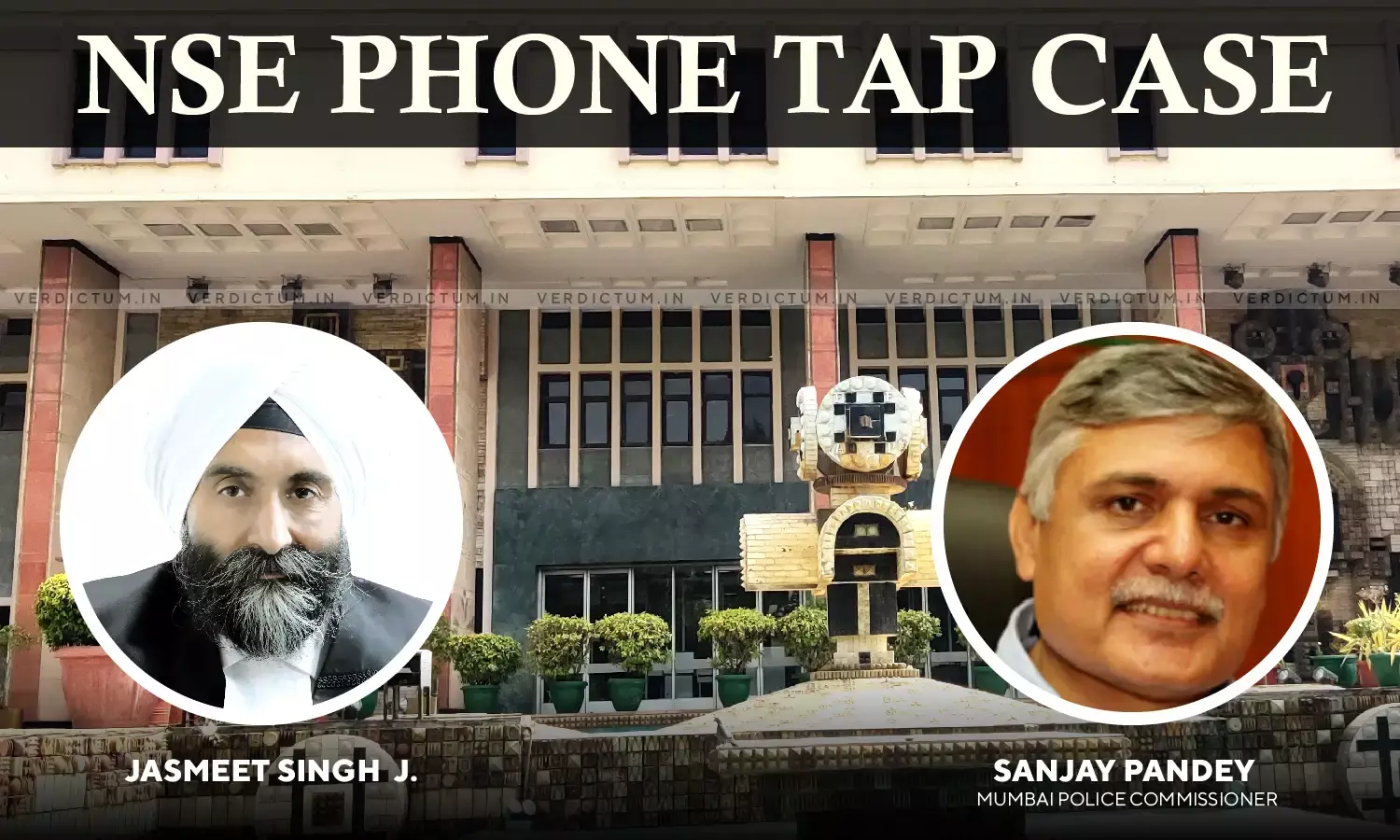'Prima Facie Not Guilty': Delhi HC Grants Bail To Mumbai Police Commissioner In NSE Phone Tap Case

The Delhi High Court on Thursday granted bail to Mumbai Police Commissioner Sanjay Pandey in a money laundering case related to the alleged illegal phone tapping and snooping of National Stock Exchange (NSE) employee.
The Bench of Justice Jasmeet Singh observed that the Commissioner is prima facie not guilty of acquiring or retaining the proceeds of crime.
The Court thus held –
"…according to sec.45 PMLA, prima facie, there are reasonable grounds to believe that the Applicant is not guilty of the offence and he is not likely to commit any offence while on bail."
The Court further held that no scheduled offence under the Prevention of Money Laundering Act (PMLA) is prima facie made out and the Enforcement Directorate (ED) has not substantiated that the Commissioner derived or obtained any property from criminal activity.
The Bench observed, "Since none of the ingredients of the scheduled offences viz., Section 72 IT Act, Section 120B r/w 409 and 420 IPC, Section 13(2) read with 13(1)(d) PC Act are made out, there is no occasion to allege acquisition or retention of proceeds of crime which under Section 2(u) of PMLA is defined to mean proceeds arising out of scheduled offences."
The Court in its 48-page order held that the applicant cannot be held to have derived or obtained property as a result of criminal activity relating to or in relation to a scheduled offence.
The Court also held that on the basis of the material collected and referenced by the ED, it can be concluded that the central agency has not substantiated that Pandey has derived or obtained any property as a result of a scheduled offence or indulged in any activity or process relating to that property.
Furthermore, the Court clarified that at the stage of bail, it was not determining the guilt of the accused but only assessing the matter on broad probabilities.
The money laundering case being probed by the ED arose from a CBI FIR against the Commissioner and his company iSec Services Private Limited for the alleged commission of offences under the Indian Penal Code, Indian Telegraph Act and Prevention of Corruption Act.
According to the CBI, iSec, in conspiracy with other accused persons illegally intercepted MTNL lines at the NSE between 2009 and 2017 and recorded calls by various exchange officials. It has been alleged that the telephone monitoring was carried out by iSec without taking permission from the competent authority as required under the provisions of the Indian Telegraph Act and also without the knowledge or consent of the NSE employees.
It was alleged by the ED that the revenue of 4.54 Crore generated by iSEC for providing the services constituted the 'proceeds of crime' under the PMLA.
Pandey was arrested by the ED on July 19, 2022, and was subsequently sent to judicial custody.
The Court in its order held that the alleged interception of the phone calls of the employees of the NSE is prima facie violative of Telegraph Act and Indian Wireless Telegraphy Act but the offences under the said statutes are not scheduled offences.
In this context, the Bench observed –
"…tapping phone lines or recording calls without consent is a breach of privacy. The right to privacy enshrined under Article 21 of the Constitution demands that phone calls not be recorded. Only with consent of the individuals concerned, can such activity be carried out otherwise it will amount to breach of the fundamental right to privacy."
"In the present case, recording or tapping of phone lines by ISEC was not an action of the State. The facets of privacy include right of noninterference with the individual body, protection of personal information and autonomy over personal choices. Consent is essential when it comes to recording phone lines which aspect was disregarded by both NSE and ISEC," the Bench further held.
The Court found merit in the Applicant's submission that contractual compensation of Rs. 4.54 crores for services rendered cannot amount to a "pecuniary advantage" in terms of the Prevention of Corruption Act.
Furthermore, the Bench observed, "The allegations in the prosecution case nowhere make out a case that the dominion or control over the property was acquired by the Applicant herein in the capacity of being a Public Servant."
The Court held that the Prosecution has failed to satisfy the ingredients of criminal breach of trust as defined in Section 405 of the IPC, since there is not even a whisper therein of any misappropriation of property. Further, the prosecution case is also completely silent on there being any wilful loss caused to any person either by ISEC or the Applicant.
While granting bail, the court directed Pandey to join the investigation whenever asked to, appear before the trial court when the case is taken up, and keep his mobile number switched on at all times.
The Court thus granted bail to Pandey and disposed of the bail application.
Cause Title – Sanjay Pandey v. Directorate of Enforcement
Click here to read/download the Judgment
With PTI Inputs

